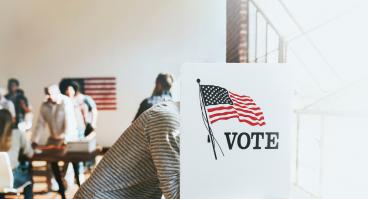A Presidential Election During the Time of COVID-19

Table of Contents
Author(s)
Mark P. Jones
Fellow in Political Science | Joseph D. Jamail Chair in Latin American StudiesJohn B. Williams
Fellow, Presidential Elections ProgramTo access the full conference report, download the PDF in the left-hand sidebar.
About the Presidential Elections Program
Founded in 2017, the Baker Institute’s Presidential Elections Program is the nation’s first program solely dedicated to the study of U.S. presidential campaigns and elections. Experts who participate in the program examine presidential elections in a nonpartisan manner, providing timely analysis during and after each presidential election cycle and allowing stakeholders of all political parties and groups to better understand the changing dynamics of presidential campaigns.
As part of its activities, the program conducts biennial conferences on topics of high political and policy salience. These conferences are held in the year preceding and after each presidential election to explore the dynamics of that contest and its effects on elections and democracy in the United States.
The Presidential Elections Program builds on the unrivaled experience of the institute’s honorary chair, Secretary James A. Baker, III, who played a leading role in five presidential campaigns and later supervised the legal team that preserved George W. Bush’s victory in 2000. It is fitting that the country’s premier institution devoted to the study of presidential elections is located at Rice University’s James A. Baker III Institute for Public Policy.
In August 1976, President Gerald Ford demonstrated his high regard for Baker by asking him to be his national campaign chairman for the general election effort against Georgia Governor Jimmy Carter. The national press dubbed Baker a “Miracle Man” for transforming the Ford campaign, which was initially seen as having no realistic hope of defeating Carter. Under Baker’s guidance, the campaign was revived, and Ford narrowly lost the Electoral College by a mere 18,490 votes in Hawaii and Ohio.
Baker then began to organize George H. W. Bush’s Republican presidential primary campaign in 1980. Former California Governor Ronald Reagan ultimately won the nomination, but not before he unified his party by choosing his most tenacious primary rival as his running mate: Bush.
In the 1980 general election, Baker was a senior advisor to the Reagan–Bush campaign, with specific responsibility for the presidential debates. Baker’s acute political instincts, his prior Washington experience, and his attention to detail made a strong impression on the Reagans. And so, Reagan asked Baker to be his White House chief of staff.
Again, with Baker’s assistance, Reagan was reelected in 1984 with a 49-state landslide victory over former Vice President Walter Mondale in a campaign largely run from Baker’s chief of staff office.
In 1988, Bush was a two-term vice president and the putative front-runner in the Republican primaries. With Reagan’s reluctant blessing, Baker left what by then was his prestigious post as secretary of the treasury and assumed command of Bush’s presidential A Presidential Election During the Time of COVID-19 4 campaign. Bush defeated Michael Dukakis to become the 41st president of the United States, and Baker became its 61st secretary of state.
As the 1992 election year began, Bush’s high approval ratings began to erode. In July, he asked Baker to resign his cabinet post and to take over the leadership of his re-election campaign. That November, Bush lost after his campaign was adversely affected by the independent candidacy of Ross Perot.
In 2000, Baker returned to the presidential electoral process, this time to manage Texas Governor George W. Bush’s legal team in the Florida recount process. Under Baker’s leadership, the Bush campaign successfully pursued its complex legal case that led from county offices in south Florida to the U.S. Supreme Court in Washington, D.C. After the Supreme Court ruled in his favor, Bush became the nation’s 43rd president.
Between December 1 and December 3, 2020, the Presidential Elections Program hosted its third conference, “A Presidential Election During the Time of COVID-19.” Held virtually across three days, the conference brought together a diverse group of academics, campaign consultants, journalists, and other prominent individuals to review the dynamics and outcome of the 2020 presidential election. Veteran political consultants Stephanie Cutter, the deputy campaign manager for former President Barack Obama’s 2012 re-election campaign, and Beth Myers, a senior advisor on Mitt Romney's 2012 campaign for president and a campaign manager for his 2008 presidential race, served as the conference’s honorary co-chairs. This report summarizes the presentations and discussions of the many individuals who participated in the conference’s five thematic panels as well as a moderated conversation featuring Cutter and Myers.

